

Why Facebook's Web Browser is Google's Worst Nightmare. When Facebook started out, their problem was getting more users.
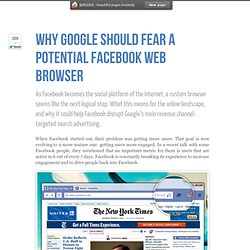
That goal is now evolving to a more mature one: getting users more engaged. In a recent talk with some Facebook people, they mentioned that an important metric for them is users that are active in 6 out of every 7 days. Facebook is constantly tweaking its experience to increase engagement and to drive people back into Facebook. A major problem is that we’re not on Facebook all the time. Inside Facebook's massive cyber-security system - tech - 26 October 2011. FACEBOOK has released details of the extraordinary security infrastructure it uses to fight off spam and other cyber-scams.

Known as the Facebook Immune System (FIS), the massive defence network appears to be successful: numbers released by the company this week show that less than 1 per cent of users experience spam. Yet it's not perfect. Researchers have built a novel attack that evaded the cyber-defences and extracted private material from real users' Facebook accounts. It took just three years for FIS to evolve from basic beginnings into an all-seeing set of algorithms that monitors every photo posted to the network, every status update– indeed, every click made by every one of the 800 million users.
Interactive video turns Facebook fears into 2 minutes of horror. Unfriend this man, now.
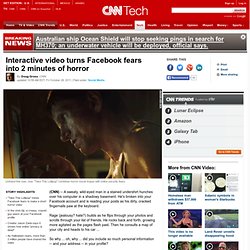
"Take This Lollipop" combines horror movie tropes with online security fears. "Take This Lollipop" mines Facebook fears to make a short horror videoIn the viral clip, a creepy, crazed guy peers at your Facebook profileCreator Jason Zada says it shows how online "privacy is dead"As Halloween nears, more than 2 million people have shared the video (CNN) -- A sweaty, wild-eyed man in a stained undershirt hunches over his computer in a shadowy basement. He's broken into your Facebook account and is reading your posts as his dirty, cracked fingernails paw at the keyboard. The Democratic Republic of Facebook. The social network is not especially keen on consultation, preferring diktat and data collection on your every move Status update: It is not your Facebook page; it’s Facebook’s.
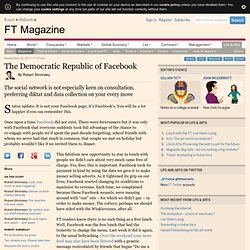
You will be a lot happier if you can remember this. Once upon a time Facebook did not exist. There were forerunners but it was only with Facebook that everyone suddenly took full advantage of the chance to re-engage with people we’d spent the past decade forgetting; school friends with whom we never had that much in common; that couple we met on holiday but probably wouldn’t like if we invited them to dinner. This fabulous new opportunity to stay in touch with people we didn’t care about very much came free of charge. Variety, not viral spread, is key to Facebook growth - tech - 02 April 2012. The notion that certain ideas spread like viruses is ingrained in everything from product marketing to political campaigning.
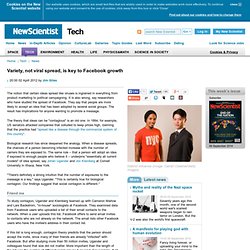
It is also wrong, say researchers who have studied the spread of Facebook. They say that people are more likely to accept an idea that has been adopted by several social groups. The result has implications for anyone wanting to promote a message. The theory that ideas can be "contagious" is an old one. In 1884, for example, US senators attacked companies that colluded to keep prices high, claiming that the practice had "spread like a disease through the commercial system of this country". Biological research has since deepened the analogy. Salman Rushdie and Facebook’s pseudonym policy. This article arises from Future Tense, a collaboration among Arizona State University, the New America Foundation, and Slate.
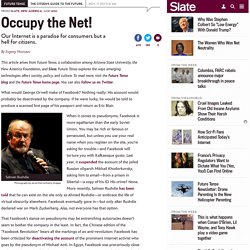
Future Tense explores the ways emerging technologies affect society, policy, and culture. To read more, visit the Future Tense blog and the Future Tense home page. You can also follow us on Twitter. Facebook is starting to lose its touch. By Kevin KelleherThe opinions expressed are his own.
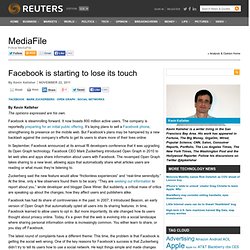
Facebook is steamrolling forward. It now boasts 800 million active users. The company is reportedly preparting for an initial public offering. It’s laying plans to sell a Facebook phone, strengthening its presence on the mobile web. But Facebook’s plans may be hampered by a new backlash against the company’s efforts to get its users to share more of their lives online. Technology - Alexis Madrigal - The Case for Facebook. Let's not let 10 days of share price fluctuation blind us to Facebook's unprecedented accomplishments.
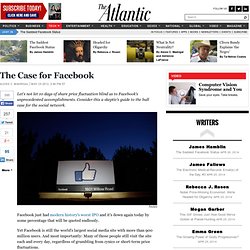
Consider this a skeptic's guide to the bull case for the social network. Reuters Facebook just had modern history's worst IPO and it's down again today by some percentage that will be quoted endlessly. Yet Facebook is still the world's largest social media site with more than 900 million users. And most importantly: Many of those people still visit the site each and every day, regardless of grumbling from cynics or short-term price fluctuations. tl;dr version The largest social media site is still the largest social media site. Facebook phone: Mark Zuckerberg’s terrible idea to enter the smartphone market. Kimihir Hoshino/AFP/Getty Images.
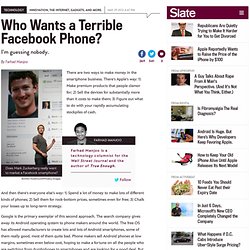
There are two ways to make money in the smartphone business. There’s Apple’s way: 1) Make premium products that people clamor for; 2) Sell the devices for substantially more than it costs to make them; 3) Figure out what to do with your rapidly accumulating stockpiles of cash. Farhad Manjoo is a technology columnist for the Wall Street Journal and the author of True Enough. Follow And then there’s everyone else’s way: 1) Spend a lot of money to make lots of different kinds of phones; 2) Sell them for rock-bottom prices, sometimes even for free; 3) Chalk your losses up to long-term strategy. Facebook's Surprisingly Humble, $1 Billion Acquisition of Instagram - Alexis Madrigal - Technology. Mark Zuckerberg has good news for Facebook users -- and maybe even for Instagrammers. Facebook just bought Instagram for about $1 billion in cash and Facebook shares. Whoa. Facebook: The Ultimate Dot-Com. History will record that Mark Zuckerberg wasn’t the first college student to have the idea of enabling people to set up Web pages and share stuff with their friends.
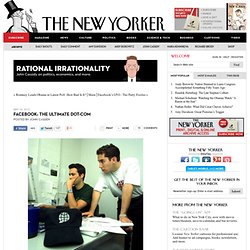
Yesterday, my colleague Silvia Killingsworth wrote about the Winklevoss twins, two Harvard grads who famously accused Zuckerberg of stealing the idea for Facebook while working on their fledgling site Connect U. Before the Winklevii, there were the folks behind MySpace and Friendster. And before them, way back in 1995, there were Todd Krizelman and Stephen Paternot, who launched TheGlobe.com from their dorm rooms at Cornell.
TheGlobe.com allowed people to create their personal space online, upload pictures, and set up what came to be known as blogs. By 1998, it had more than two million members, which was then considered impressive. TheGlobe.com’s I.P.O. marked the beginning of the dot-com bubble’s epic stage. While the term “dot-com” disappeared, the idea survived. Zuckerberg Bombshell: Did Facebook Bankers Quietly Slash Forecasts Before IPO? In the wake of a disastrous stock offering comes what looks like an enormous scandal for the social-media giant. It's time for us to finally wake up and see how awful Facebook truly is, says Dan Lyons.
Two days after a disastrous initial public offering, shares in Facebook are collapsing. They’re down to $33, well below the IPO price of $38. That makes sense since, at $38, the shares were wildly overpriced, valuing Facebook at more than $100 billion. Facebook, banks sued over pre-IPO analyst calls. "Bankers Are Stupid" by Stefano Casertano. Exit from comment view mode. Click to hide this space Facebook's failed IPO illustrates the hubris and greed of the bankers that advised the company. Instead of pursuing a sensible investment strategy, they tried to cash in on the public offering of one of the world's most revolutionary companies. Please forgive me for the blunt use of adjectives, but the Facebook experience leads me to the belief that bankers are stupid. The Facebook Fallacy. Facebook not only is on course to go bust but will take the rest of the ad-supported Web with it.
Given its vast cash reserves and the glacial pace of business reckonings, this assertion will sound exaggerated. But that doesn’t mean it isn’t true. At the heart of the Internet business is one of the great business fallacies of our time: that the Web, with all its targeting abilities, can be a more efficient, and hence more profitable, advertising medium than traditional media. Facebook, with its 900 million users, its valuation of around $60 billion (as of early June), and a business derived primarily from fairly traditional online advertising, is now at the heart of the heart of this fallacy. The daily and stubborn reality for everybody building businesses on the strength of Web advertising is that the value of digital ads decreases every quarter, a consequence of their simultaneous ineffectiveness and efficiency. 7 Things to Know About Facebook’s Investor Scandal. Facebook and its bankers are accused of secretly disclosing negative information to some investors. But according to a legal expert, no laws were broken, writes Dan Lyons.
Facebook and its bankers are engulfed in complaints related to the initial public offering of the company’s stock. The IPO has been a disaster, with Facebook shares almost immediately collapsing below their original $38 offering price. Business - Derek Thompson - The Sorry Six-Day History of Facebook, Inc: A Glitch, a Snitch, and a Tumble. The biggest tech IPO in history is turning into a giant metaphor of greed and hyper-optimism, as bankers and analysts struggle to figure out what went wrong and who to blame. Does Facebook's IPO Prove That Zuckerberg Isn't Up to the Job? Facebook, at $104 Billion, Is Already Bigger Than Amazon, Visa, and McDonald's - Derek Thompson - Business. Does Facebook Have a Foreign Policy? - by David Kirkpatrick.
Toward the end of 2008, Facebook CEO Mark Zuckerberg was musing about a massive political rally in Colombia earlier that year. A young man had started a Facebook group to show his revulsion against the FARC guerrillas, and one month later, on Feb. 4, millions of people across Colombia and around the world rallied in opposition to FARC. The anti-FARC protests were the first ripple in what would become this year's global wave -- the use of social media in massive political movements, as Facebook and Twitter have almost overnight become the world's collective soapboxes, petition sheets, and meeting halls.
It may have started in the Middle East with outraged friends on Facebook, but the chain reaction eventually led to landscape-altering citizens' movements and demonstrations not just in Tunisia, Egypt, and Libya, where despots were toppled, but also Syria, Yemen, Bahrain, and later in Spain, Israel, India, Britain, the United States, and elsewhere. And more is coming. Ruling Facebookistan - By Rebecca MacKinnon. At 6 p.m. Facebook Threatens Legal Action Against Employers Asking for Your Password - Megan Garber - Technology. The network doesn't want your boss seeing your profile, either. Is Your Facebook Password Like Your Mail, House Key, or Drug Test? - Megan Garber - Technology.
FACEBOOK: LIKE? From the Archive: the chances are, you have a Facebook profile yourself. Is Facebook making us lonely? No, the Atlantic cover story is wrong. Photograph by Cathy Yeulet/Hemera. Facebook Asserts Trademark on Word 'Book' in New User Agreement. Facebook is trying to expand its trademark rights over the word “book” by adding the claim to a newly revised version of its “Statement of Rights and Responsibilities,” the agreement all users implicitly consent to by using or accessing Facebook. Selling You on Facebook. I Didn't Tell Facebook I'm Engaged, So Why Is It Asking About My Fiancé? - Sara Marie Watson - Technology. The morning began with my typical browsing routine: email, top-reads RSS news feed, a brief scan of Twitter, then Facebook.
Facebook buys Face.com: Will mobile facial recognition kill privacy? Photo by Karyn Poupee/AFP/Getty Images. Facebook privacy notice debunked. Facebook Aims Low, May Allow the Under-13 Crowd to Sign Up.